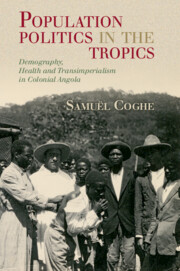Book contents
- Population Politics in the Tropics
- Global Health Histories
- Population Politics in the Tropics
- Copyright page
- Dedication
- Contents
- Maps
- Figures
- Tables
- Acknowledgements
- Note on the Spelling of Proper Names
- Introduction
- 1 Sleeping Sickness, Depopulation Anxieties and the Emergence of Population Politics
- 2 Tropical Medicine and Sleeping Sickness Control Before 1918
- 3 Introducing Social Medicine: Inter-Imperial Learning and the Assistência Médica aos Indígenas in the Interwar Period
- 4 Re-assessing Population Decline: Medical Demography and the Tensions of Statistical Knowledge
- 5 Saving the Children: Infant Mortality and the Politics of Motherhood
- 6 The Problem of Migration: Depopulation Anxieties, Border Politics and the Tensions of Empire
- Conclusion
- Epilogue: Demography and Population Politics, 1945–75
- Bibliography
- Index
Epilogue: Demography and Population Politics, 1945–75
Published online by Cambridge University Press: 20 January 2022
- Population Politics in the Tropics
- Global Health Histories
- Population Politics in the Tropics
- Copyright page
- Dedication
- Contents
- Maps
- Figures
- Tables
- Acknowledgements
- Note on the Spelling of Proper Names
- Introduction
- 1 Sleeping Sickness, Depopulation Anxieties and the Emergence of Population Politics
- 2 Tropical Medicine and Sleeping Sickness Control Before 1918
- 3 Introducing Social Medicine: Inter-Imperial Learning and the Assistência Médica aos Indígenas in the Interwar Period
- 4 Re-assessing Population Decline: Medical Demography and the Tensions of Statistical Knowledge
- 5 Saving the Children: Infant Mortality and the Politics of Motherhood
- 6 The Problem of Migration: Depopulation Anxieties, Border Politics and the Tensions of Empire
- Conclusion
- Epilogue: Demography and Population Politics, 1945–75
- Bibliography
- Index
Summary
In the historiography on post-Second World War demographic developments, it has often been argued that fears of de- and underpopulation regarding Africa subsided and gave way to a new discourse that problematised rapid population growth and imminent overpopulation instead. Karl Ittmann and Monica van Beusekom, for instance, have identified such changes in the population discourse among colonial experts in French West Africa and parts of British Africa, most notably Kenya and Nigeria.1 This discursive reversal was not only due to local changes, nor was it nurtured by colonial experts alone. After the Second World War, the demographic development of Africa was increasingly viewed through the lens of a global discourse that considered unbridled population growth in the so-called ‘Third World’ an ecological and political risk for the planet and one of the main reasons for persistent underdevelopment, poverty and global inequality. Excessive population growth was a constitutive feature of this new ‘Third World’.2
- Type
- Chapter
- Information
- Population Politics in the TropicsDemography, Health and Transimperialism in Colonial Angola, pp. 250 - 261Publisher: Cambridge University PressPrint publication year: 2022

